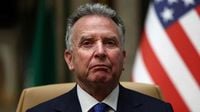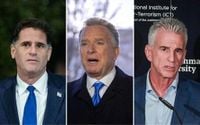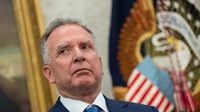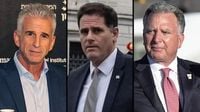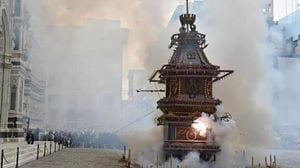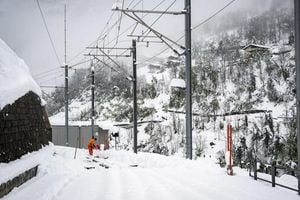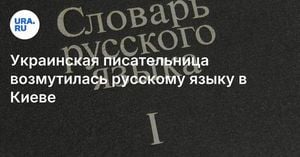In a critical moment for U.S.-Iran relations, special envoy Steve Witkoff has emerged as a key figure in the ongoing negotiations aimed at curbing Iran's nuclear ambitions. His recent statements and meetings reflect a complex balancing act between diplomatic engagement and the threat of military action.
On April 11, 2025, Witkoff articulated the U.S. position on Iran's nuclear program, emphasizing a firm stance on dismantling any potential weaponization. "I think our position begins with dismantlement of your program. That is our position today," Witkoff told the Wall Street Journal. He underscored that the U.S. would not tolerate the weaponization of Iran's nuclear capabilities, stating, "Where our red line will be, there can’t be weaponization of your nuclear capability." This strong declaration set the tone for the subsequent diplomatic efforts.
Three days later, during an interview with Fox News, Witkoff reiterated that Iran must not enrich uranium beyond 3.67%. He noted, "The president means what he says, which is: Iran cannot have a bomb," and highlighted the alarming levels of uranium enrichment that Iran has reportedly achieved, with some estimates indicating enrichment levels as high as 60% in certain contexts. Witkoff's remarks reflect a growing urgency as the U.S. seeks to verify Iran's enrichment activities and ensure compliance with international standards.
As negotiations progressed, Witkoff's approach appeared to shift, indicating a potential compromise. On April 14, he stated, "A deal with Iran will only be completed if it is a Trump deal," emphasizing the need for a framework that guarantees peace and stability in the Middle East. This position aligns with President Trump's broader strategy to engage Iran diplomatically while maintaining the threat of military action as leverage.
In a significant development, Israeli officials Ron Dermer and David Barnea met with Witkoff in Paris on April 18, 2025, just ahead of the second round of talks scheduled to take place in Rome. The meeting aimed to influence U.S. negotiations, as Israeli Prime Minister Benjamin Netanyahu has expressed concerns that the Biden administration might pursue a deal reminiscent of the 2015 agreement, which was abandoned by Trump in 2018.
Netanyahu's apprehensions stem from the belief that any agreement must not only limit Iran's nuclear program but also eliminate it entirely. Israeli Defense Minister Israel Katz reiterated this commitment, stating, "We will do whatever it takes to realize them," referring to the goal of preventing Iran from obtaining nuclear weapons.
Meanwhile, Iranian Foreign Minister Abbas Araghchi has signaled a willingness to negotiate, provided that the U.S. does not impose unrealistic demands. "If they demonstrate seriousness of intent and do not make unrealistic demands, reaching agreements is possible," he said, indicating that Iran's right to enrich uranium is non-negotiable. His comments highlight the delicate balance of power in the negotiations, as Iran seeks to maintain its sovereign rights while addressing international concerns.
The upcoming talks in Rome, set to begin on April 19, 2025, are expected to focus on establishing a framework for future negotiations. Witkoff has expressed optimism about the discussions, describing the initial meetings as "positive, constructive, compelling." However, the stakes are high, with both sides aware that failure to reach an agreement could lead to increased tensions and potential military conflict.
In the backdrop of these negotiations, Witkoff's role has drawn scrutiny. As a businessman with no formal diplomatic experience, his rapid ascent to a pivotal position in U.S. foreign policy has raised questions about the effectiveness of his approach. Critics argue that his lack of traditional diplomatic training could hinder progress in complex negotiations, especially against seasoned Iranian diplomats.
Despite these concerns, Witkoff has garnered support from key figures within the Trump administration. Secretary of State Marco Rubio praised his leadership, stating, "Steve has been an incredible leader in the America First movement," while acknowledging the challenges ahead. Witkoff's close relationship with Trump, built over decades, has afforded him significant influence and access within the administration.
As the negotiations unfold, the geopolitical landscape remains fraught with tension. Trump's administration continues to grapple with internal divisions over the best approach to Iran, with some officials advocating for military action while others favor diplomatic engagement. Witkoff's statements reflect this ongoing struggle, as he navigates the competing interests and pressures within the administration.
In a recent statement, Trump emphasized the importance of diplomacy, saying, "I’m not in a rush to do it because I think that Iran has a chance to have a great country and to live happily without death." This sentiment underscores the administration's desire to find a peaceful resolution, even as military options remain on the table.
As the world watches closely, the outcome of the upcoming talks could have far-reaching implications for U.S.-Iran relations and the stability of the Middle East. With Witkoff at the helm, the U.S. aims to strike a balance between firm demands and diplomatic overtures, hoping to navigate a path toward a lasting agreement.
In conclusion, the negotiations with Iran represent a critical juncture for the Trump administration, as it seeks to address one of the most pressing foreign policy challenges of our time. Witkoff's role as a negotiator will be pivotal in determining whether a diplomatic solution can be achieved or whether tensions will escalate further.
